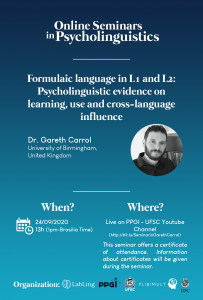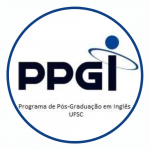11º Online Seminars in Psycholinguistics
The Language and Cognitive Processes Lab (LabLing/UFSC) and the Bilingual and Multilingual Language Processing Research Group (Plibimult/UFC) would like to invite you to the Online Seminars in Psycholinguistics, a series of videoconferences related to language learning and processing. Certificates will be available for the videoconference and information about them will be given during the talk.
 Formulaic language in L1 and L2: Psycholinguistic evidence on learning,use and cross-language influence
Formulaic language in L1 and L2: Psycholinguistic evidence on learning,use and cross-language influence
Gareth Carrol (University of Birmingham, United Kingdom)
🕤 24/09/2020 – 1pm (Brasilia Time)
Live on PPGI-UFSC Youtube channel
(http://bit.ly/SeminarioGarethCarrol)
(It will only be possible to watch the talk by using the link above)
Formulaic languagecovers the range of multiword sequences (idioms, collocations, etc.) that forman important part of language competency. Research in how these sequences arelearned and used by first (L1) and second (L2) speakers has gathered pace inrecent years. In this talk I will review evidence that focuses on threequestions: how first and second language users process formulaic language inreal time; how languages interact during processing in the L2; and how languageusers learn new multiword expressions. The talk will focus on results from arange of experiments that help to demonstrate how we can research these questions,as well as what the results tell us about the underlying mechanisms.
Bio:
GarethCarrol is a Senior Lecturer in psycholinguistics at the University ofBirmingham, UK. His research looks at how language users understand idiomsand other types of figurative phrase, such as conventional metaphors. This workhas focused on the factors that influence processing and comprehension innative and non-native speakers, including aspects such as familiarity,transparency and context. He is also interested in formulaic language moregenerally, and have conducted several studies to explore the processing of arange of formulaic phrases such as collocations and binomials, where wordchoice is restricted or highly conventionalised. His work uses experimental techniquessuch as eye-tracking, reaction times and offline techniques (ratings andspeaker judgements) to build a detailed picture of how language users processlanguage at the multiword level.








